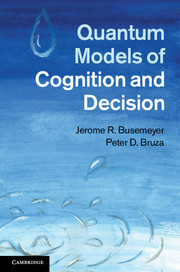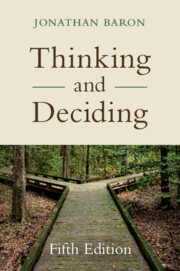Quantum Models of Cognition and Decision
$60.99 (C)
- Authors:
- Jerome R. Busemeyer, Indiana University, Bloomington
- Peter D. Bruza, Queensland University of Technology
- Date Published: June 2014
- availability: Available
- format: Paperback
- isbn: 9781107419889
$
60.99
(C)
Paperback
Other available formats:
Hardback, eBook
Looking for an examination copy?
This title is not currently available for examination. However, if you are interested in the title for your course we can consider offering an examination copy. To register your interest please contact [email protected] providing details of the course you are teaching.
-
Much of our understanding of human thinking is based on probabilistic models. This innovative book by Jerome R. Busemeyer and Peter D. Bruza argues that, actually, the underlying mathematical structures from quantum theory provide a much better account of human thinking than traditional models. They introduce the foundations for modelling probabilistic-dynamic systems using two aspects of quantum theory. The first, 'contextuality', is a way to understand interference effects found with inferences and decisions under conditions of uncertainty. The second, 'quantum entanglement', allows cognitive phenomena to be modeled in non-reductionist ways. Employing these principles drawn from quantum theory allows us to view human cognition and decision in a totally new light. Introducing the basic principles in an easy-to-follow way, this book does not assume a physics background or a quantum brain and comes complete with a tutorial and fully worked-out applications in important areas of cognition and decision.
Read more- Proposes a new way to build probabilistic and dynamic models of cognition and decision, challenging the traditional concepts of logic and probability theory
- Applies mathematical principles from quantum theory to cognitive and decision sciences - one of the first attempts to apply principles of quantum theory to fields outside of physics
- Includes an elementary tutorial of fundamental ideas; detailed applications to empirical findings; and computer programming code for many of the computational examples using MATLAB
Reviews & endorsements
"This is the first book putting forward the main scientific results of an intriguing and promising new research domain called 'quantum cognition.' In this emergent field, the mathematical structure of quantum theory is employed to model essential aspects of human cognition impossible to be modeled properly within classical approaches. The authors are both engaged intensively in quantum cognition and wrote a high-quality and well-understandable treatise showing how this new approach carries the potential of a real breakthrough, with deep implications for how cognition will be looked upon in the decades to come. The approach may also signify a thorough new opening to the old problem of artificial intelligence and the structuring of semantics."
--Diederik Aerts, Center Leo Apostel for Interdisciplinary Studies, Brussels Free UniversitySee more reviews"This book is about why and how formal structures of quantum theory are essential for psychology - a breakthrough resolving long-standing problems and suggesting novel routes for future research, convincingly presented by two main experts in the field."
--Harald Atmanspacher, Department of Theory and Data Analysis, Institut fuer Grenzgebiete der Psychologie und Psychohygiene e.V."Mathematical models of cognition so often seem like mere formal exercises. Quantum theory is a rare exception. Without sacrificing formal rigor, it captures deep insights about the workings of the mind with elegant simplicity. This book promises to revolutionize the way we think about thinking."
--Steven Sloman, Cognitive, Linguistic, and Psychological Sciences, Brown University"...The title grabs the reader’s attention.... The presentation is clear and self-contained, requiring no prior knowledge of quantum mechanics on the part of the reader. Every serious researcher in cognitive science needs to engage with this volume."
--Dr. H. Van Dyke Parunak, Computing Reviews"The book is intended for anyone who is interested in this topic, and does not presume any preliminary knowledge. It includes a detailed introduction to the corresponding quantum physics, along with a detailed description of the corresponding psychological experiments.... It is very thought-provoking, a must-read for anyone interested in understanding human behavior and human judgments..."
--V. Ya. Kreinovich, Mathematical ReviewsCustomer reviews
Not yet reviewed
Be the first to review
Review was not posted due to profanity
×Product details
- Date Published: June 2014
- format: Paperback
- isbn: 9781107419889
- length: 424 pages
- dimensions: 229 x 152 x 22 mm
- weight: 0.57kg
- contains: 54 b/w illus. 20 tables
- availability: Available
Table of Contents
1. Why use quantum theory for cognition and decision? Some compelling reasons
2. What is quantum theory? An elementary introduction
3. What can quantum theory predict? Predicting question order effects on attitudes
4. How to apply quantum theory? Accounting for human probability judgment errors
5. Quantum inspired models of concept combination
6. An application of quantum theory to conjoint memory recognition
7. Quantum-like models of human semantic space
8. What about quantum dynamics? More advanced principles
9. What is the quantum advantage? Applications to decision making
10. How to model human information processing using quantum information theory
11. Can quantum systems learn? Quantum updating
12. What are the future prospects for quantum cognition and decision?
Sorry, this resource is locked
Please register or sign in to request access. If you are having problems accessing these resources please email [email protected]
Register Sign in» Proceed
You are now leaving the Cambridge University Press website. Your eBook purchase and download will be completed by our partner www.ebooks.com. Please see the permission section of the www.ebooks.com catalogue page for details of the print & copy limits on our eBooks.
Continue ×Are you sure you want to delete your account?
This cannot be undone.
Thank you for your feedback which will help us improve our service.
If you requested a response, we will make sure to get back to you shortly.
×



